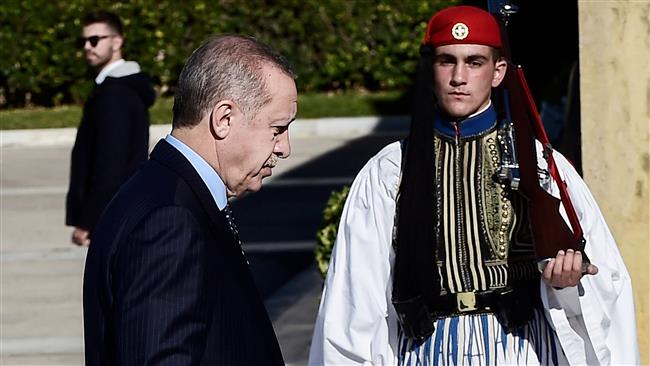In an interview with Greece’s local broadcaster Skai TV on Wednesday night, the Turkish president assured the Greek people that the era of strained relations between the two neighbors “have become history now.”
“Trust and stability are our two most important principles” in bilateral relations, Erdogan said.
He is scheduled to meet with President Prokopis Pavlopoulos and Prime Minister Alexis Tsipras on Thursday, a day before traveling to northern Greece to visit the Muslim community there.
Before landing in Athens, however, he did touch on the highly controversial issue of reviewing the 94-year-old Treaty of Lausanne.
In 1923, some five years after the conclusion of World War I and almost a year after the collapse of the Ottoman Empire, the Treaty of Lausanne was ratified between Turkey and the allied forces, including Britain, France, Italy, and Greece, in a bid to settle territorial disputes in the wake of the war, and on August 1924, it ultimately came into force, delineating the borders of Turkey and Greece.
Over the years, however, the two NATO allies have suffered strains over their sea boundaries and almost slipped into a military confrontation over an unpopulated small island in the Aegean Sea in 1996. Tensions have eased ever since, however.
“Airspace and territorial waters and the different measurements can be improved. I think during the course of time, all of the treaties need a revision, and Lausanne, in the face of the recent developments needs to be spruced up, a revision if you will,” Erdogan further said.
The Turkish president’s comments angered his Greek hosts, prompting them to express worries.
“The interview today with Erdogan raises serious worries and questions. The Greek government and the prime minister hope the visit is an opportunity to build bridges, not walls,” said Greek government spokesman Dimitris Tzanakopoulos in a statement released late Wednesday.
Tzanakopoulos added that respecting the treaty in its entirety was the only “non-negotiable cornerstone” on which all kinds of real cooperation between the two sides must be founded.
He added that Erdogan’s allusions to revisions of the accord were not in accordance with the “spirit” of what Athens sought to achieve in bilateral diplomatic relations with Turkey.
